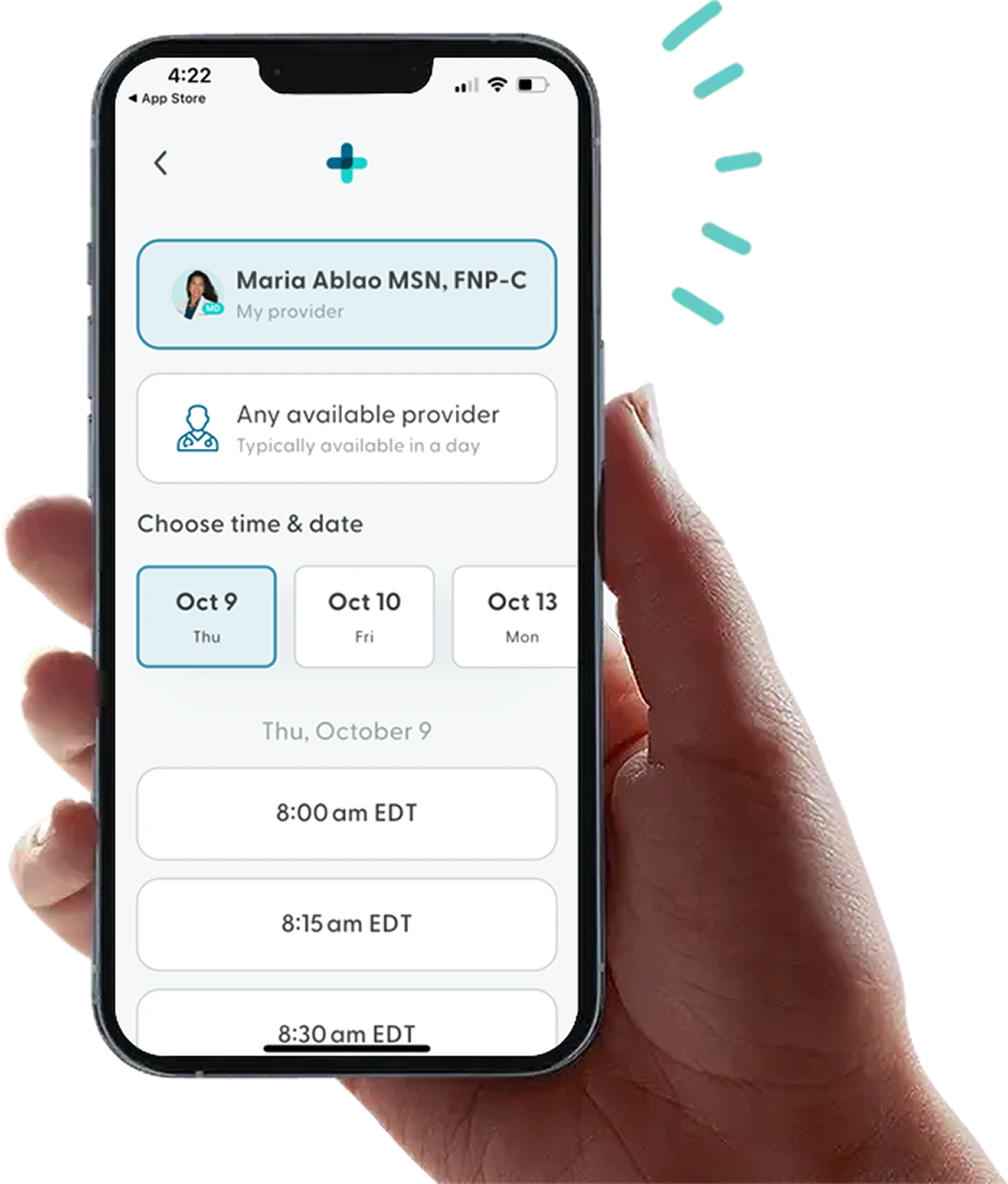Understanding Menopause Symptoms
Menopause is a natural part of life that most women will experience when they enter their mid-40s and 50s.
This process marks the end of a woman’s fertility cycle and often causes a range of uncomfortable symptoms when it happens.
It’s important to know how to cope with menopause when you start developing symptoms.
Not only is this essential for reducing your discomfort, but it can also help you build mental resilience during a challenging time.
Manage menopause with expert care.
Schedule your online consultation now to get tailored advice and treatment support.


Understanding Menopause
Menopause is the natural biological process that marks the end of menstruation and a woman’s reproductive stage.
It’s usually diagnosed when you’ve gone without a period for 12 months.
During this phase, the female body undergoes significant hormonal changes that have a big impact on their daily lives.
One of the most notable changes is the decline in estrogen and progesterone levels. These are hormones responsible for maintaining various bodily functions.
Estrogen helps the body regulate the menstrual cycle and maintain bone health. As this hormone decreases during menopause, women may experience irregular periods.
They are also at an increased risk of developing bone density problems that could contribute to osteoporosis.
Progesterone — the hormone responsible for preparing the uterus for pregnancy — also declines during menopause. This may lead to symptoms like mood swings and sleep disturbances.
When does menopause start?
The average age range for menopause is typically between 45 and 55, but it’s important to note that each woman’s experience differs.
Some go through menopause earlier or later, and the severity and duration of their symptoms can vary significantly.
Key Point: What is Early or Premature Menopause?
Early menopause — also known as premature menopause or premature ovarian failure — refers to experiencing the natural menopause process before the age of 40.
It can be caused by various factors, including:
- A family history of genetic conditions
- Autoimmune disease
- A history of illnesses like breast cancer
- Cancer treatment like chemotherapy or radiation therapy
- Surgery such as removal of the ovaries
- Primary ovarian insufficiency
Early menopause can have significant physical and emotional implications for women and it requires appropriate medical attention.
Common Symptoms of Menopause
There is no specific age when you will definitely experience menopause, so it can be difficult to determine if you’re experiencing symptoms because of this condition or something else.
In this section, we’ll take a closer look at the common signs of menopause to help you understand it better.
Hot flashes and night sweats
Hot flashes and night sweats are common symptoms of menopause.
The flashes are characterized by a sudden and intense feeling of heat that spreads throughout the body. They are usually accompanied by sweating and a flushed appearance.
Episodes of hot flashes can occur unexpectedly, disrupting your daily life and causing discomfort.
Night sweats are similar to hot flashes and typically occur during sleep. They can be disruptive and lead to a restless night or poor sleep quality.
The impact of hot flashes and night sweats on sleep and daily functioning can be significant. They often lead to fatigue, irritability, and concentration difficulties.
Managing hot flashes and night sweats
There are a number of ways to manage hot flashes and night sweats.
Common methods include:
Dressing in layers to easily adjust your clothing as body temperature fluctuates
Keeping your environment cool by using fans or air conditioning
Practicing deep breathing exercises and relaxation techniques for relief
Some women may find herbal remedies like black cohosh or evening primrose oil helpful for alleviating symptoms like:
Loss in bone density
Hot flashes
Night sweats
It’s essential to discuss these remedies with your doctor before taking them to ensure they will be effective in helping manage your symptoms.
Sleep disturbances
Sleep disturbances are another common aspect of menopause that can cause frustration.
Women going through this hormonal transition typically experience various sleep challenges that can significantly impact the quality of their rest.
This is usually due to symptoms like night sweats and hot flashes that cause you to wake up more frequently during the evening.
Fluctuating hormone levels also make it more difficult to fall and stay asleep.
Frequently getting poor quality sleep can lead to decreased productivity, irritability, fatigue, and a diminished sense of overall health.
The best way to cope with sleep disturbances is to seek professional medical support. Your doctor will help you explore relaxation techniques and recommend healthy sleep habits for quality rest.
Mood swings and emotional changes
Mood swings and emotional changes are typical symptoms of menopause due to significant hormone fluctuations.
The sharp decline in estrogen and progesterone can disrupt the neurotransmitters responsible for regulating your mood, leading to uncontrollable emotions. These emotional shifts are marked by sudden and intense mood changes. Irritability, anxiety, and even episodes of depression can occur during this phase.
Frequent mood swings can impact a person’s daily life, affect their relationships, and reduce their overall happiness.
Managing mood swings and emotional changes
Implementing strategies for managing mood swings can help you promote emotional balance. These include:
Exercising regularly to increase endorphin release and reduce stress
Practicing mindfulness, meditation, and deep breathing
Building an emotional support network that can offer understanding and guidance
Keep in mind that each woman’s experience is unique, and you should find strategies that work best for you.
Actively managing your mood swings can help you navigate menopause with a positive mindset and greater resilience.
Vaginal dryness and discomfort
Menopause contributes to changes in sexual functioning. This is due to the decline of estrogen, which may lead to vaginal dryness and itching.
Individuals with vaginal dryness may experience pain and discomfort during sex. You may also experience chafing and inflammation of the vaginal wall.
Vaginal dryness puts women at an increased risk of urinary tract infections (UTIs) and other medical conditions that can be uncomfortable to deal with.
Managing vaginal dryness
There are a few things you can do to manage vaginal dryness and minimize discomfort. This includes:
Using a vaginal moisturizer or lubricant to soothe irritation
Using estrogen creams and tablets
Getting a vaginal ring that releases a low dose of estrogen
If you’re taking measures to treat vaginal dryness, you should keep an eye on your symptoms to see if they improve.
Make an appointment with your doctor if your symptoms don’t improve after two months of treatment.
Changes in sexual desire
The decline in estrogen that occurs during menopause affects your libido and sex drive. Lower levels of estrogen can reduce your desire to have sex while also making it harder for you to become aroused.
Other symptoms of menopause — like hot flashes, mood swings, and irritability — may also make you feel less interested in intimacy with your partner.
Managing changes in sexual desire
The best way to manage these changes is to be aware of them and have open conversations with your partner.
This allows you to set realistic expectations about being intimate and helps your partner to understand your needs.
During this phase, what feels good might also be different from before. Most medical professionals agree that longer periods of physical stimulation before having sex usually work well.
If you are concerned about your low sex drive or libido, it’s best to speak to a healthcare professional for expert guidance on how you can manage it.
Loss in bone density
When your estrogen levels decrease during menopause, it can result in decreased bone density. This is because estrogen plays an important role in helping the body maintain strong bones.
It’s estimated that women can lose up to 10-25% of their bone mass in the first five years after menopause.
Having weaker bones puts women at an increased risk of developing osteoporosis — a disease that changes the structure of the bones and often results in fractures.
Although bone density loss can’t always be prevented, there are a number of things you can do to keep your bones healthy. These may include:
Including more calcium-rich foods in your diet
Doing weight-bearing exercises more regularly
Maintaining adequate vitamin D levels
Avoiding excessive alcohol consumption and caffeine intake
Avoiding smoking and nicotine products
If you are worried about your bone density and developing osteoporosis, reach out to your doctor to discuss your concerns.
They can help you monitor your bone strength and suggest appropriate management strategies to guide you through this phase.
Lifestyle Modifications for Managing Menopausal Symptoms
Lifestyle modifications can go a long way in helping you manage menopause symptoms.
These changes can alleviate discomfort and improve your quality of life, helping you to remain positive while going through menopause.
Common lifestyle modifications include:
Quit smoking: Smoking has been linked to symptoms like hot flashes and may even increase your risk of experiencing early menopause. Quitting can help you reduce the severity of some of your symptoms while improving your overall well-being.
Create healthy habits: Regularly exercising, enjoying a balanced diet, and maintaining an appropriate weight can play a big role in alleviating menopause symptoms. These habits can help you avoid menopausal weight gain by increasing muscle mass, strength, and balance which may have decreased. They can also help stabilize your mood by reducing feelings of stress and anxiety.
Stay hydrated: Drinking more water is a simple way to relieve symptoms like hot flashes, nausea, frequent headaches, and bladder irritation. Water helps the body to retain moisture, so ensuring that you are hydrated can help you improve some of the discomfort experienced during menopause.
Avoid excessive alcohol and caffeine consumption: Alcohol and caffeine may contribute to spikes in body temperature which can cause hot flashes. These spikes may worsen night sweats and increase discomfort. Avoiding these drinks or limiting your intake can help reduce the severity of some menopause symptoms you may experience.
Alternative therapies such as acupuncture, herbal supplements, and mindfulness-based practices may also be helpful for managing symptoms.
Acupuncture is the practice of inserting needles into certain parts of the body to relieve pressure. It may help alleviate symptoms of menopause like physical discomfort, hot flashes, and night sweats.
Some herbal supplements may also be beneficial if you’re looking for symptomatic relief.
Herbs like black cohosh, red clover, and evening primrose oil may all be effective in reducing severe symptoms. It’s important to note that the efficacy of herbal supplements for menopause relief is still being studied.
Before taking any medication, speak to your healthcare provider to determine if it’s a safe and suitable treatment for you.
Seek Support and Medical Intervention
Menopause is not typically a life-threatening condition, and experiencing it doesn’t necessarily require medical intervention.
However, if you suspect that you are in a perimenopausal phase, it’s a good idea to schedule a checkup with your doctor. They will perform a physical examination to help determine which menopausal phase you might be in.
Your doctor may also recommend treatments like hormone therapy to help alleviate early menopause symptoms.
It’s also recommended to seek medical attention if your symptoms are having a significant impact on your daily life — such as preventing you from performing normal tasks.
If you are going through menopause or might be in the near future, build a strong support network of friends and family. They can help you through periods of discomfort or when you aren’t feeling well due to mood swings and emotional changes.
Your friends and family may also offer guidance that can help you find some relief from your menopause symptoms. In most cases, it will also just feel good to have someone to talk to about what you’re going through.
Where Can I Learn More About Menopause?
If you’re concerned about your symptoms or want to know more about menopause, LifeMD is here to help.
A team of doctors can assist you with information about menopause and provide guidance on how to effectively manage your symptoms — all from the comfort of your home.
Make an appointment, and start your journey to a healthier life.
More articles like this
Feel better with LifeMD.
Your doctor is online and ready to see you.
Join LifeMD for seamless, personalized care — combining expert medical guidance, convenient prescriptions, and 24/7 virtual access to urgent and primary care.

EstroGel®
May Be for You
You may qualify for a prescription treatment to help you manage your menopause symptoms.
Get Started Now
 Medically reviewed and edited by
Medically reviewed and edited by 








